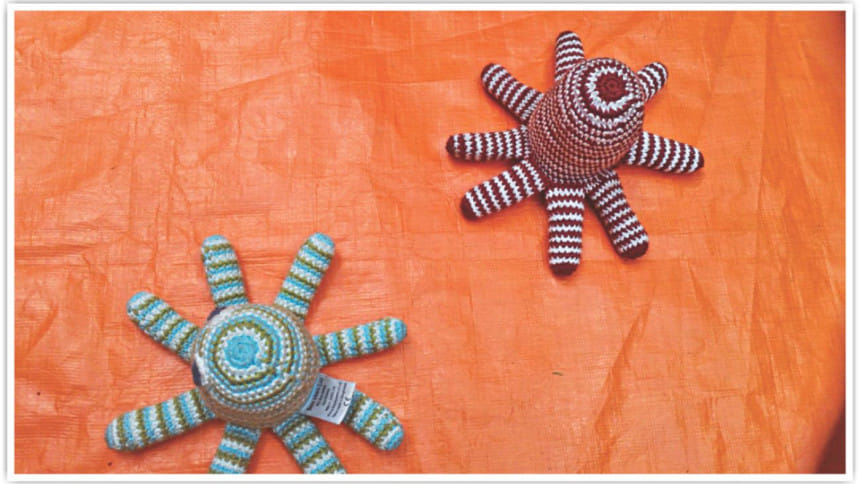Toys to give women alternative livelihood

Bina, Julekha, Munni and Jotsnya -- four women of Adrasha Char under Barisal Sadar upazila -- gathered at Feroj Miah's residence to receive training on making knitted toys.
The four -- members of the fishing community -- will be fully ready after two months' training, which started last month, and able to make toys by themselves to start their own handicraft business, their trainer Beuty Akter said.
For generations fishing has been their families' lone source of livelihood. To improve their lives by creating an alternative source of income and reduce over-fishing in this riverine southern region, Haate Bunono -- a craft export and training organisation -- has been engaged to train 300 women in Barisal and Bhola.
The Department of Fisheries has implemented this handicraft training workshop under its Enhanced Coastal Fisheries Project in Bangladesh (ECOFISHBD), said Dr Md Wahiduzzaman, district fishery officer, Barisal.
With the support of USAID and WorldFish, this project was launched in June 2014 and will continue till May 2019, said Wahiduzzaman.
The project also aims to protect the biodiversity in this region by making the local people aware of climate change, build the adaptation capacity among fishermen and update the Hilsa Fisheries Management Action Plan including an improved co-management model, the official added.

Training on making at least 300 types of toys, including doll, octopus, flower and ball, will be given to women so that they could financially be solvent by starting their own businesses and contribute to their family income, said Robiul Islam, regional officer of Haate Bunono.
"After the training is over we will contact those trainees to supply quality products. They will be paid Tk 30 to Tk 200 for each product. Later, these products will be exported to 32 countries including America and Europe," Robiul added.
"This toy making training will help me to make money and support my family financially," said Bina Begum, one of the trainees.
Another trainee Munni, a class-XII student, echoed her.
Last year, many women of Barisal Sadar, were given materials to make traditional shitol pati (large mats woven from cane skin), fishing nets, and start poultry farms which helped them create an alternative source of family income, Wahiduzzaman said.

 For all latest news, follow The Daily Star's Google News channel.
For all latest news, follow The Daily Star's Google News channel. 



Comments